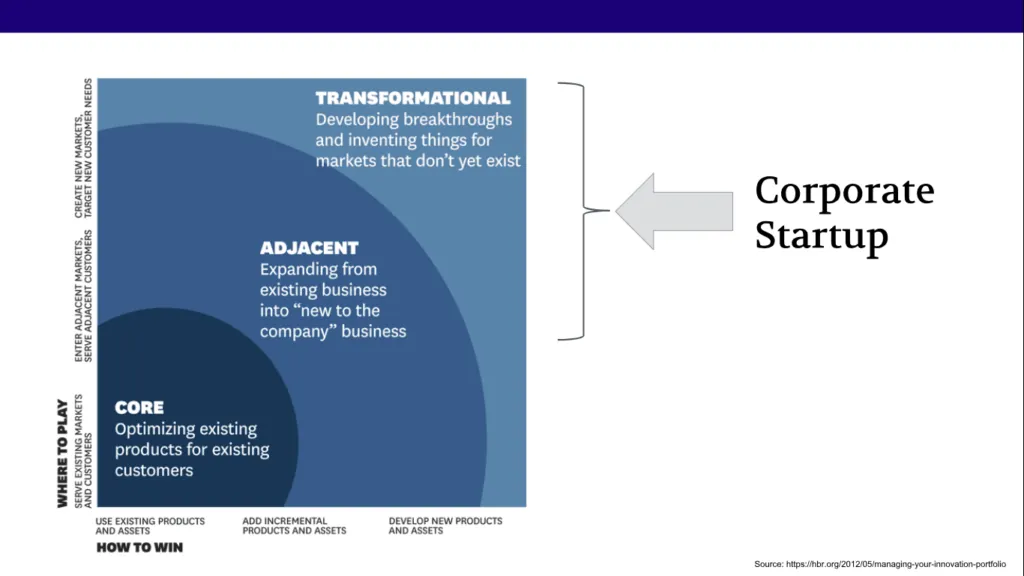

Almost every big company has its own corporate startup. It could be an internal department focusing only on experimenting with new products and business ideas. More advanced companies have even founded their own companies which are completely focused on inventing new ideas and validate them. Even though there is a felt standstill due to the coronavirus, corporate startups still can help to transform existing companies and help to generate additional profits. One key requirement to make corporate startups successful is development speed. Low code can help corporate startups extremely increasing their development speed. In this article, I will explain why the possibilities of low code can help to accelerate corporate startups.
Before we do a deep dive into the benefits of corporate startups and the reasons for establishing one I'm going to do a definition of the term corporate startup. So first, what do I mean with corporate startup? There a dozen definitions out there. I found one which derived its explanation from the famous innovation ambitious matrix.
A corporate startup is a place within a company which is focusing on developing new products and assets. There might some circumstances where a corporate startup also looks for new opportunities to add incremental products and assets. Most corporate startups I know, are highly focused on disruptive innovations for the company.

Picture copied from https://medium.com/corporate-startup-lab/what-is-a-corporate-startup-cafc30b9ebeb
However, the main goal of a corporate startup is not only to come up with new product ideas on paper. More so, their goal is to validate their hypotheses as well as learn as much as they can about the market and target customers. Corporate startups are responsible for the whole chain of product development. Starting with finding a problem worth solving, build MVPs, do interviews, run experiments and find the right product-market fit.
With this being said, corporate startups and startups, in general, need to find a way to develop products fast and efficiently. This is exactly where low code comes into play. With low code, the product teams can use already existing software components such as databases, cloud services, workflows, or UI elements. Actually, the idea of low code is not new. Big companies such as Microsoft, SAP, Salesforce, Siemens, and many more already offering low code platforms.
In my opinion corporate startups often face too many internal hurdles. The main goal of a corporate startup is to come up with new ideas, validate them, learn as much as possible and adjust the product. Everything is about having smaller changes, high development speed, and a high number of iterations. The hardest part about product development is often not the development itself. Actually, the hardest part is to come up with a product that really delivers value to customers and has a product-market fit. You can have the most technology-advanced product but if no one wants it - you failed! On the other side, many digital products are very easy to rebuild as they aren't many technological difficulties. However, they are successful on the market because they are serving a special need and solving a real problem.
The hardest part about product development is often not the development itself. Actually, the hardest part is to come up with a product that really delivers value to customers and has a product-market fit.
Corporate startups often have limitations when it comes to recruiting employees or buy certain software products. Especially, if a corporate startup and not own legal entities they are forced to follow the same processes and procedures as other departments within that company. I'm not gonna into the details about why is the wrong way to approach it. The point I want to make is that this can extremely slow down your development speed. With this in mind, corporate startups need to find other solutions to speed up their development speed and despite their personal boundaries.
Most corporate startups are developing any kind of digital products or business models. Therefore, they need software developers to build that product. As everyone knows software developers are very rare on the market. Especially, for companies in rural areas, this skill shortage is a big risk. The alternative is often to recruit freelancers or software development agencies. Even though this can be a good starting point, companies must find a solution to develop or at least to maintain the products by themselves. The other solution is to use capacities and competencies from the parent company. This seems to be a good solution at the first sight. The more you think about the more you will realize all these disadvantages which come with that. I will not go into detail here, but I will write another blog post about that issue.
So how can low code help? With certain low code platforms, it is possible to develop your own web applications or mobile apps without programming. They have visual editors which can be used to develop applications using a drag and drop editor. But that's not all. Most platforms also offer existing databases, API integration, 3rd party integration, deployment processes, and hosting.
Those platforms can accelerate your development speed massively. You don't have to worry that those platforms are not ready for scaling. Depending on the solution they are using state-of-the-art cloud services which allow you to scale without any issues. Even if you are running into some functional boundaries (which I don't think at the beginning) you can still develop your own code and integrate this into the application.
Although you can accelerate your development speed it can give you other benefits as well. When I'm talking about development speed I'm not talking only about the cost and time to come up with the first MVP of your product. I'm talking about the changes and adaptions you want to make once you gather feedback from the customers. You don't want to write that down on a backlog list and waiting for months. You may want to change this within a day to get more learnings and react to customer insights. I can tell you from my own experiences. It is an enormous feeling to be able to change certain items for your applications within hours. This is the superpower for every product owner.

Benefits for corporate startups by using low code
The product owner or the product team should be able to adjust the products by themselves. They know the target customers as well as their problems so well. They are the experts on how the product can help to solve customers' problems or creating new benefits. Why on earth should they be forced to tell someone else how to develop the product. Corporate startups don't have time to argue with internal IT departments nor have the time to wait until some freelancers have the capacity to work for them. They must be a way for them to do it by themselves.
In my opinion, a tight budget can help you to focus on important topics. You are not at risk of wasting money, because your budget doesn't allow it. However, the more expensive the development of an MVP is the fewer business ideas will be validated. Every new business idea or product is a bet as you don't know whether it will succeed. If the wager is higher you are playing fewer games. This, of course, reduces your chance of actually winning.
Even more, if you spend a huge amount of money on product development you won't kill your darling. This so-called sunk cost effect is deadly. I think it is the only reason why especially in the big corporate unprofitable products are still alive. You already invested so much money into the product development you can't stop it. Even though you will need even more money to keep going and everything got worse.
If you spend less money to develop your product versions you won't fall into the trap. It feels easier to cancel and kill product ideas if they turned out to be unprofitable. The actual loss is much smaller. At this point, I would also like to raise the aspect that the learnings the team makes also with an unprofitable product can help with the next product.
The goal of this article is to motivate you to bring more products and ideas off the ground. We don't need more product ideas on nice and fancy power presentations. We need more ways of actually doing and developing something. If your current hurdle in a corporate startup (or startup) is to have not enough software developer capacities you may want to think about alternatives. Low code can be an alternative. I think the only reason why not more people using it is the unknowingness of its potential. I, myself wasn't aware of its opportunities while I was working in a corporate startup environment.
If you are interested in finding out whether your application is suitable for low code and which platform is the right one - please reach out to us. We are happy to help you with our consultancy offering, or we help you to develop your first product with low code.

Erzähle uns in einem kostenlosen Erstgespräch mehr über dein individuelles Projekt. Wir helfen dir bei den nächsten Schritten und teilen unser Wissen.
Nachricht schreiben